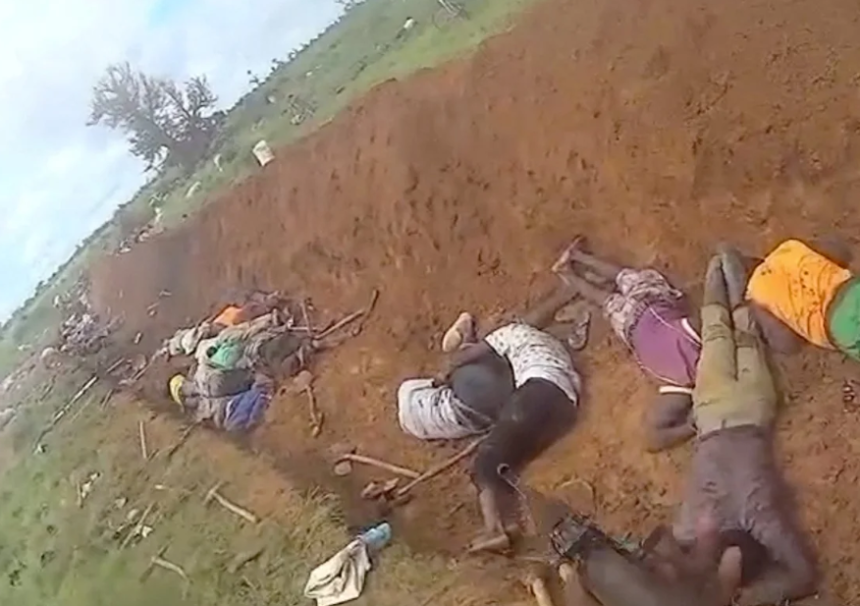In an August raid on a village in Burkina Faso, terrorists with ties to al Qaeda shot up to 600 people dead in a couple of hours, according to a security assessment by the French government that almost doubled the number of fatalities reported in previous reports. The latest figure would make the assault one of the worst single attacks in Africa in recent decades, with citizens being shot dead as they built trenches to protect the isolated village of Barsalogho.
According to multiple videos of the August 24 attack posted by pro-JNIM accounts on social media, militants from Jama’at Nusrat al-Islam wal-Muslimin (JNIM), an al Qaeda affiliate based in Mali and active in Burkina Faso, opened fire methodically as they swept into the outskirts of Barsalogho on motorcycles and shot down villagers, who lay helpless in the freshly upturned dirt of the trench. The movie is intercut with the sound of automatic gunfire and the screams of victims as they are shot while seemingly attempting to play dead. A large number of the dead were women and children.
If the French government verifies the horrifying death toll, it would indicate a particularly cruel period in the Sahel, a region of West Africa that is becoming more and more lawless and directly south of the Sahara. Security initiatives led by the French and American militaries have not been able to stop the spread of jihadists. The French and American armies left Mali, Burkina Faso, and Niger following a string of coups. The assessment, provided to CNN by a French security officer, claims that instead of strengthening the juntas’ hold, the Russian mercenaries left a void that was fertile ground for jihadists.
Reuters reported a translation by Site Intelligence Group that stated it had targeted militia members connected to the army, not civilians, although it had killed close to 300 people.
“The government of Burkina Faso, which no longer really has a military strategy to offer and whose propaganda discourse seems out of breath and ideas,” the report says, “sees itself as unable to sustain the rate at which large-scale deadly attacks (at least a hundred deaths) against civilian populations or defense and security forces have been occurring for several weeks.”
According to the French official, there has been a “very significant deterioration in the security situation” in Burkina Faso, where “security forces are unable to cope with the increased freedom of action enjoyed by armed-terrorist groups.” The article adds that the military is fighting to maintain its strength and reputation and mentions an attack on a military convoy in the village of Tawori, which occurred 15 days before to the attack in Barsalogho and resulted in the deaths of “no fewer than 150 soldiers.”
Another JNIM attack shook Bamako, the city of neighbouring Mali, on September 17. The attack targeted the airport and other vital facilities, killing over seventy people.
“Defense trenches” turned into mass graves.
In order to defend the town from jihadists operating nearby, the military gave the residents of Barsalogho orders to construct a massive trench network around it. This led to the murder that took place there. Witnesses stated that the JNIM gunmen erroneously claimed the civilians were fighters due to their involvement, before attacking the defenses in the middle of building.
Even after leaving the village, one survivor told CNN that he was one of the dozen men the army had ordered to build the trenches that Saturday. He wished to remain anonymous. At about 11 a.m., he heard the first gunshots while in a trench 4 kilometers away from the town.
He remarked, “I started to crawl into the trench to escape.” However, it appeared that the assailants were pursuing the trenches. I crept out and found the first victim, who was covered in blood. In fact, blood was all over the place where I was going. Everywhere you looked was yelling. I crouched under a shrub and hid there till later in the day.
After that, the village had very few males left. It was the most horrific sight I had ever seen in my life to watch the dead come from the killing site on motorized carts. There were no tears for women or children to cry. We were stunned beyond belief. If there are no tears to cry, how can one cry?
“We are not normal anymore—we are the survivors. The issue transcends all of us. The carnage began right in front of me. Right in front of me were fired the initial bullets. Among those who picked up and buried the dead was me. He said that the early claims of 300 dead were unreliable and that he saw his deceased pals when he was asleep. “Anyone who disputes it ought to visit me.”
A second survivor told CNN that the incident claimed the lives of two of her family members. They carried out killings all day long. We spent three days gathering bodies that were dispersed all over the place. Our emotions were filled with fear. There were so many dead on the ground when it came time for the burial that it was hard.”
The attack led to heated protests in which Burkina Faso’s junta commander, Captain Ibrahim Traore, who seized power in the second of two subsequent military coups in 2022, was mocked as “IB Captain Zero” for allowing civilians to construct the trenches. According to the French investigation, the Minister of Civil Service had planned for each community “to organize itself and have its own response plan to an attack,” including their development.
Despite a more significant threat from jihadists, the military junta has not accepted responsibility for ordering citizens to dig the trenches unprotected. The authorities, according to survivors, did not want them to talk about what had happened.
The coups in Burkina Faso in 2022 were precipitated by the country’s discontent about the government’s failure to stop the violence perpetrated by jihadists, which had killed thousands of people for nearly ten years, even with heavy military support from France. However, academics and human rights advocates claim that under Traore, the violence has gotten worse.
Even though France’s military actions in the region were initially effective, by 2014, anti-French sentiment had grown. Despite increasing its counterterrorism efforts, France was unable to keep up with the growing armed organizations endangering citizens. As a result, locals started to be suspicious of the previous colonial authority.
Traore has barely been in public once since the tragedy, and the evaluation, which was written in late August, raises concerns about his mental health and suitability for the position. According to the study, “We see there all the authorities’ powerlessness to provide a serious and credible response to the terrorist threat.”















